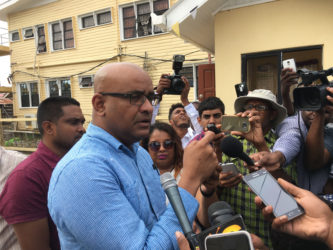It is up to the police to determine whether former president Bharrat Jagdeo has immunity in the Pradoville 2 probe, according to State Minister Joseph Harmon, who yesterday argued that the constitutional protection cannot necessarily save a president from judicial intervention and criminal prosecution.
Article 182 of the Constitution provides for immunity for a president. It states that a president cannot be charged for offences committed while in office and that a president is protected from being personally answerable to the courts whether in civil or criminal proceedings for actions done while in office.
Harmon was asked at yesterday’s post-Cabinet press briefing about government’s views on the Article and whether there will be any moves to change it. In response, he said that the constitution is very clear on issues relating to immunity of a sitting president who takes certain steps while he is in office. That is respected, he said, before saying that he believed it must be one of the matters to be looked at in the constitutional reform process.
“…Certainly even though there are immunities, there are certain exceptions because you cannot commit an egregious type of act—which is something that an international court or anybody can deem to be as such—and still believe that nothing will happen,” he said while making reference to the recent impeachment of South Korean President Park Geun-hye.

“The court determined that there were enough grounds for that president to be impeached and she was impeached and most likely she will also face criminal charges,” he said.
Jagdeo, who is now the Leader of the Opposition, was arrested at his office on Tuesday by officers of the Special Organised Crime Unit (SOCU), who questioned him about the sale of land at Pradoville 2 at undervalued prices to members who served in his Cabinet.
Jagdeo later told reporters that he invoked his presidential immunity after being questioned and was subsequently told that he was free to go. “I asked, ‘Are you asking me questions in my private capacity or my official capacity at that time? ’Cause if you are doing that, you are going to breach the veil of official immunity for official acts. That will have far reaching consequences in this country because anything that [President David] Granger does as president in his official capacity too will be challenged,” he said, while adding that the SOCU officers did not answer his questions.
Harmon, who is an attorney, was asked about Jagdeo’s invocation of immunity and he quickly pointed out that it is up to the police to make that determination and he made it clear that the government will not interfere in the investigation, which is being done by an arm of the police force, SOCU.
Noting that government has been investing heavily in the training of law enforcement officials with the assistance of friendly countries, Harmon said that the investigators are sufficiently equipped to face whatever issues may arise. “On the question of immunity, they will determine that at that point in time whether in fact immunity exists, whether it is covered by the offence that is allegedly committed by an individual and this is the kind of additional training that our policemen are receiving and so when issues of immunity arise, it will be dealt with right there at the police station because the policemen have been given that additional training and they know exactly what has to be done,” he said.
Harmon noted that Article 182 basically gives immunity to the president while he is in office but added that the situation in Guyana has evolved. “…The anticipation I believe [and] the expectation of the framers of our constitution was that a president, once he leaves office, will basically have a more quiet, sedate life but the situation in Guyana is totally different. They have people who have been in office as president and are now in the National Assembly,” he said, before questioning if the protection still exists now that the former president is once more active in politics. “So how could you now claim those immunities while you are actively engaged in day-to-day politics?’ he questioned.
Harmon also said that government has had problems with a former president who writes almost every week in the newspapers and says things that need to be dealt with. “Usually a president is given certain levels of courtesy but if in fact by their actions after they leave office they descend into the arena, then I would say that you would have to be dealt with by the persons in the arena,” he said, making an apparent reference to former president Donald Ramotar.





